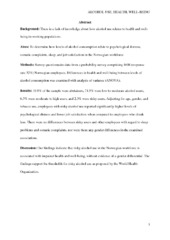Alcohol use among Norwegian workers: Associations with health and well-being
Peer reviewed, Journal article
Accepted version
Permanent lenke
https://hdl.handle.net/1956/19283Utgivelsesdato
2018-03Metadata
Vis full innførselSamlinger
Originalversjon
https://doi.org/10.1093/occmed/kqy014Sammendrag
Background There is a lack of published data on the association between alcohol consumption and health and well-being in working populations. Aims To determine how levels of alcohol consumption are associated with psychological distress, somatic complaints, sleep and job satisfaction in the Norwegian workforce. Methods Survey questionnaire data from a probability sample comprising Norwegian employees. The association between alcohol consumption and health and well-being was assessed using analysis of covariance. Results There were 1608 respondents (response rate 32%); 20% of the sample were abstainers, 72% were low- to moderate-alcohol users, 6% were moderate to high users and 2% were risky users. Adjusting for age, gender and tobacco use, employees with risky alcohol use reported significantly higher levels of psychological distress and lower job satisfaction when compared to employees who drank less. There were no differences between risky users and other employees with regard to sleep problems and somatic complaints, nor were there any gender differences. Conclusions Our findings indicate that risky alcohol use in the Norwegian workforce is associated with impaired health and well-being, with no evidence of a gender differential. The findings support the thresholds for risky alcohol use as proposed by internationally recognized guidelines for alcohol consumption.
